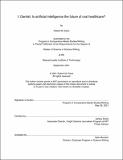| dc.contributor.advisor | Smart, Ashley | |
| dc.contributor.author | Davis, Robert M. | |
| dc.date.accessioned | 2022-02-07T15:21:17Z | |
| dc.date.available | 2022-02-07T15:21:17Z | |
| dc.date.issued | 2021-09 | |
| dc.date.submitted | 2021-07-06T15:14:45.735Z | |
| dc.identifier.uri | https://hdl.handle.net/1721.1/140052 | |
| dc.description.abstract | The field of dentistry has earned a reputation for being more prone to misdiagnosis and overtreatment than other medical subspecialties. This is driven, at least in part, by a professional culture that has traditionally been less scientific and evidence-based than that of general medicine. It is also partially driven by an array of economic pressures that have predisposed dentists towards more aggressive and expensive treatment options, as well as by the legitimate ambiguities of clinical decision making in oral healthcare.
In the past decade, at least half a dozen dental AI companies have begun selling software that they claim can help mitigate the problem of misdiagnosis and overtreatment in dentistry. Some of their systems attempt to do this by monitoring insurance claims, and flagging suspicious patterns in patient records. Other systems focus on automating the diagnosis process itself— scanning patient X-rays to identify simple issues like a cavity, for example, or a tooth abscess.
On paper, dental AI companies pitch their products as helpful tools that can assist dentists by automating busywork and providing a backstop against innocent human error. They suggest that computer vision technology can help ensure that every dentist has access to the latest best practices and evidence-based care recommendations. However, AI technology can do much more than merely play the role of digital assistant. In many ways, these systems also serve as a kind of hall monitor, providing tacit enforcement of the clinical best practices that inform their programming.
This project explores a simple question: What do we gain, and what do we lose, by bringing artificial intelligence to oral healthcare? | |
| dc.publisher | Massachusetts Institute of Technology | |
| dc.rights | In Copyright - Educational Use Permitted | |
| dc.rights | Copyright retained by author(s) | |
| dc.rights.uri | https://rightsstatements.org/page/InC-EDU/1.0/ | |
| dc.title | I, Dentist: Is artificial intelligence the future of oral healthcare? | |
| dc.type | Thesis | |
| dc.description.degree | S.M. | |
| dc.contributor.department | Massachusetts Institute of Technology. Graduate Program in Science Writing | |
| mit.thesis.degree | Master | |
| thesis.degree.name | Master of Science in Science Writing | |
